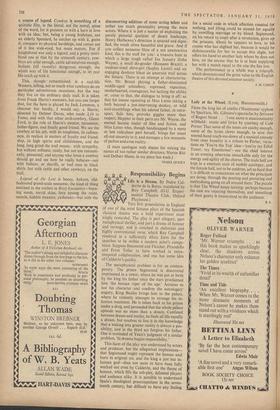Responsibility Begins
AeL Life is a Dream. By Pedro Cal-
THIS first presentation in England of one of the most faMous plays of the Spanish classical theatre was a bold experiment most amply rewarded. The play is part allegory, part metaphysical thriller, and part a drama of honour and revenge, and is couched in elaborate and highly conventional verse, which Roy Campbell rendered in a sufficiently dilute form for the speeches to be within a modern actor's compe- tence. Suppose Beaumont and Fletcher, Pirandello and Ernst Toiler to have worked in extra- temporal collaboration, and one has some idea of Calder6n's quality.
The metaphysical problem is for us contem- porary. The prince Segismund is discovered imprisoned in a tower, where, he was put at birth by the king his father since the stars proclaimed him 'the human viper of his age.' Anxious to test his character and confirm the astrologers' augury, King Basilio brings him to the palace, where he violently attempts to revenge his in- human treatment. He is taken back to his prison under a drug, and persuaded that the whole palace episode was no more than a dream. Confused between dream and reality, he finds all' life equally a dream, but resolves to live it in the knowledge that a waking into greater reality is always a pos- sibility, and in the third act forgives his father. One is reminded of Yeats's judgment of a similar problem, 'In dreams begins responsibility.'
This facet of the play was understood by actors and producer, but the allegorical implications— that Segismund might represent the human soul born in original sin, and the king a just but in- human god—does not seem to have been fully worked out even by Calderon, and the theme of honour, which fills the sub-plot, defeated players and audience alike. It is possible to understand Spain's theological preoccupations in the seven- teenth century, but difficult to have any feeling
for a social code in which affection counted for nothing, and jilting. could be atoned for equally by unwilling marriage or by blood. Segismund, on his return to court after a revolution, gives up the princess, whom he appears to love, to his cousin who has slighted her, because it would be dishonourable for her to accept this slight, but offers his hand to another lady whom he does not love, on the excuse that he is at least supplying her with a match equal to the one she has lost.
The performance as a whole was a triumph, which demonstrated the great value to the English theatre of this devoted amateur society.






































 Previous page
Previous page